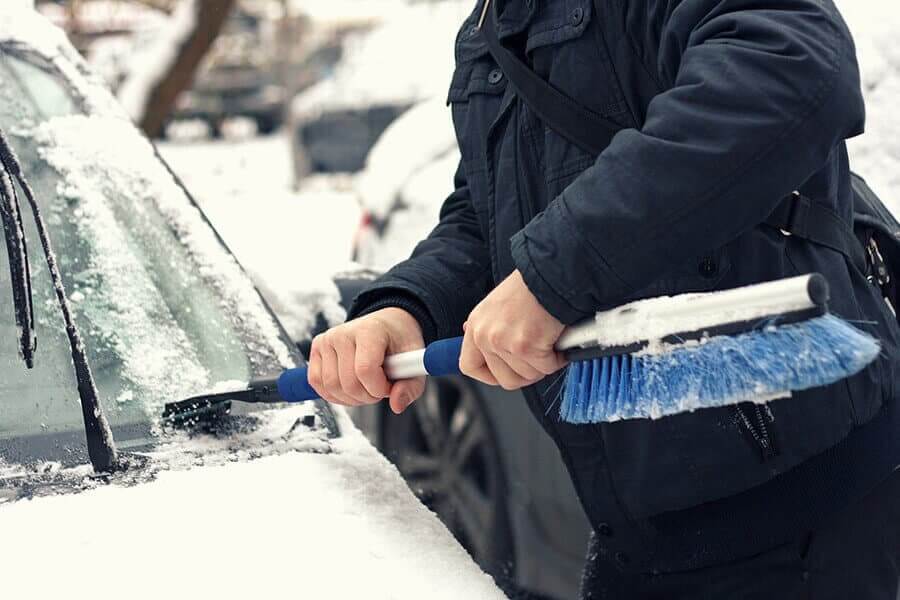
There’s nothing worse than unexpected, expensive car repairs. Most of us rely on our vehicles heavily to get to work, shuttle kids around, run errands and more. There are some circumstances that are beyond our control and can be the death knell for vehicles if not properly planned for. Winter, and all of the challenging conditions that come with it is one of those circumstances. Here are some of the most important car maintenance tips to help your vehicle and wallet survive the winter season.
8 Important Car Maintenance Tips for Winter Season
1. Be Prepared
Even the most well-maintained vehicles can suffer an unexpected breakdown. This means you need to make sure you are ready, just in case. Your vehicle should be stocked with food, water, flashlights, blankets and a hand-held radio in your vehicle. Road salt and flares can also be handy to have on hand. While the tips below are all designed to ensure you don’t find yourself broken down on the side of the road in a winter storm, make certain you have all the necessities stocked and available, just in case. It is highly recommended to have all the necessary auto insurance coverage to be prepared for the worst case scenario.
2. Check Your Tire Tread and Pressure
Your tire tread is what helps grip the road. If you are driving in snow and ice with worn tires, your vehicle will have a much harder time staying on the road. Winter tires are built with deeper tread and more flexibility to maintain traction on winter and icy roadways. While not every winter will require winter tires, you should ensure that your tires have enough tread and grip to help you travel safely.
In addition, your tire pressure will typically fluctuate during the cold season. When the temperature drops so does your tire pressure. Cold temperatures can compress the air in your tires and cause your tire pressure indicator light to come on. Make certain to check your tire pressure often to ensure there is not another underlying issue and keep a small emergency car repair kit that includes a portable air pump and pressure gauge in the vehicle.
3. Check your battery
Extremely cold weather can impair a marginal batteries ability to start. Low temperatures can put a strain on a battery that is not in tip-top shape. To better protect yourself, and prevent being stranded, make sure to have your battery inspected before the winter weather comes.
4. Windshield Wipers
While your windshield wipers may seem small they can make a big difference. Too often, people don’t realize they need new wipers until the rain or snow is pouring from the sky and visibility becomes zero. The cold winter weather can damage the rubber of your vehicles windshield wipers. The relatively small expense of new wiper blades is well worth the ability to see what’s ahead when driving in difficult conditions.
5. Belts and hoses
Winter weather takes a toll on your car’s belts and hoses and if they are not in optimal condition, they can snap and break. Taking the time to replace any parts that are not pristine will help you and your vehicle make it through the winter season in one piece.
6. Don’t be afraid to fill up
Driving with an almost empty tank can allow moist air to crystallize and possibly lead to ice in the fuel lines. Make sure that you stop regularly to fill up and keep gas in the tank to prevent this from happening.
7. Take care of your windshield
Just like your wiper blades, it is important to take proper care of your windshield to ensure safe visibility. While you may be tempted to thaw the ice on your windshield with a hot cup of water, don’t do it! The difference in temperature of the cold windshield and the hot water may actually crack your windshield causing inconvenient and possibly expensive damage. A much safer alternative is a sturdy ice scraper. They come in many different makes and models and can safely remove the ice from your windshield without damaging your car.
8. Wash your vehicle regularly
While it can be annoying to get your car washed and then have it rain a few hours later, regular washing is a long-term investment. Salt on snowy roads can damage your car’s paint and wheels. To prevent this, wash your car regularly and remove any salt that could be the culprit of damage over time.
While every person that reads this may think it doesn’t apply to them; overconfidence is all too common. Whether you have driven in the snow your whole life or you have a vehicle that is designed to drive in the snow, use some common-sense tactics and defensive driving to make sure that everyone makes it to their destination safely: slow down, give yourself plenty of time, and be mindful of others on the road. Ice can be hidden under a layer of snow and can quickly spin your vehicle out of control if you are going too fast. If you encounter someone driving dangerously, move over and allow him or her to pass.
While this list may seem like a lot, general car maintenance and a few preventative measures can keep your car running and on the road all winter long. Also, make sure your you have a car insurance before driving or you will be in trouble for not having one. An upfront investment in your vehicle’s car can prevent inconvenient and potentially expensive damage. If you would like to add or review your insurance coverage for towing, glass repair or roadside assistance, please give our office a call.
